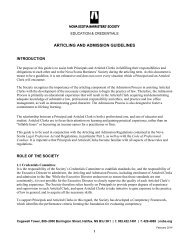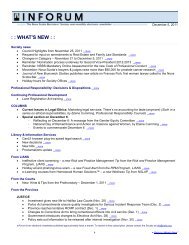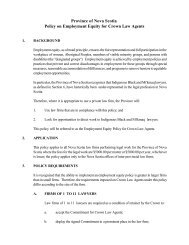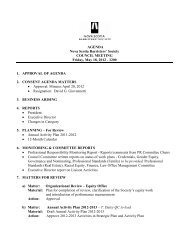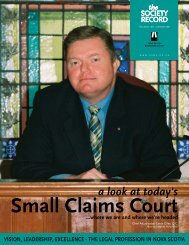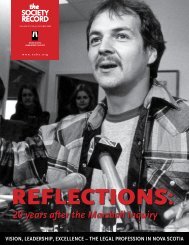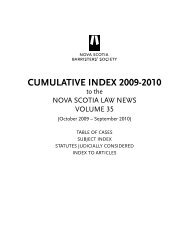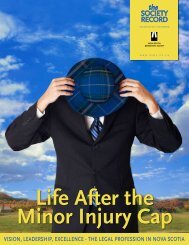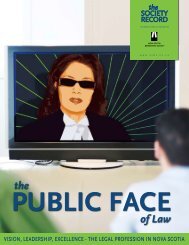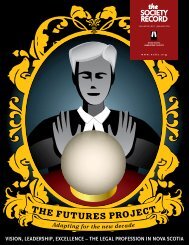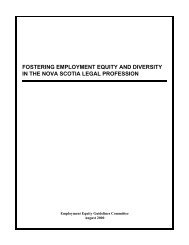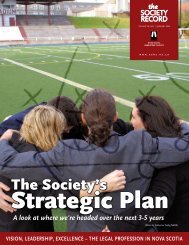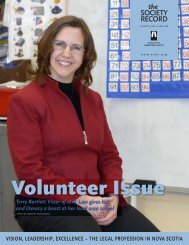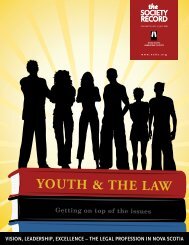the SOCIETY RECORD - Nova Scotia Barristers' Society
the SOCIETY RECORD - Nova Scotia Barristers' Society
the SOCIETY RECORD - Nova Scotia Barristers' Society
You also want an ePaper? Increase the reach of your titles
YUMPU automatically turns print PDFs into web optimized ePapers that Google loves.
in police service delivery. They presented a tour of many promising<br />
recent developments in <strong>Nova</strong> <strong>Scotia</strong>n rural and urban policing, and<br />
discussed efforts to change institutional relations and individual<br />
attitudes and behaviours.<br />
The “Role Expectations for Crown and Defence Counsel” panel<br />
began with a look at <strong>the</strong> continuum of justice involvements by<br />
people with mental illness and <strong>the</strong>n focussed on <strong>the</strong> middle ground,<br />
with two Crown and two defence lawyers surveying fitness and not<br />
criminally responsible strategic and substantive issues, Mental Health<br />
Court practice and <strong>the</strong> post-NCR dispositional phase before <strong>the</strong><br />
Criminal Review Board.<br />
The final topical panel, with one psychologist and three judges,<br />
discussed “Courtroom Dilemmas: The Judicial Role at <strong>the</strong> Junction<br />
of Criminal Justice and Mental Health”. It examined sentencing in<br />
<strong>the</strong> face of reduced judicial discretion and <strong>the</strong> hugely complicated<br />
life circumstances of accused, <strong>the</strong>ir complex variations in diagnosis<br />
and lived experience, and <strong>the</strong> revelations emerging from Mental<br />
Health Court on <strong>the</strong> obstacles <strong>the</strong> accused face in trying to live in<br />
<strong>the</strong> community.<br />
The wrap-up discussion, with representation from <strong>the</strong> judiciary, <strong>the</strong><br />
police, <strong>the</strong> academic community and <strong>the</strong> Crown and defence Bars,<br />
ensured that audience questions could be fielded in a less structured<br />
setting, with <strong>the</strong> panellists having an opportunity to respond to one<br />
ano<strong>the</strong>r as well.<br />
The conference was not intended to issue a policy paper,<br />
recommendations or an action plan, but it seems to have succeeded<br />
in its aims of providing <strong>the</strong> bench, <strong>the</strong> Bar, <strong>the</strong> police, mental health<br />
professionals, advocacy groups and community members with up-todate<br />
information and a framework for a consensus around <strong>the</strong> need<br />
to work toge<strong>the</strong>r to remediate <strong>the</strong> criminalization of persons with<br />
mental health problems.<br />
The days of housing vulnerable people for interminable periods in<br />
massive and often ineffective and abusive civil institutions have gone.<br />
New phenomena followed <strong>the</strong> deinstitutionalization wave of <strong>the</strong> late<br />
twentieth century: neglect and sometimes conflict in <strong>the</strong> community<br />
and transinstitutionalization, making many prisons de facto mental<br />
health facilities.<br />
More ga<strong>the</strong>rings like “Ambiguous Crossroads” should be held in<br />
order to continue <strong>the</strong> transition towards an era of social inclusion,<br />
prevention of crises, diversion from <strong>the</strong> justice system where possible,<br />
and fair treatment within <strong>the</strong> criminal law where this response must<br />
be used.<br />
For more information about <strong>the</strong> Canadian Institute for <strong>the</strong> Administration<br />
of Justice, see ciaj-icaj.ca. A recording of <strong>the</strong> entire conference will soon<br />
be posted on YouTube, and <strong>the</strong> event brochure is online at http://www.<br />
ciaj-icaj.ca/images/stories/eventsPDF/2013.MentalHealth.pdf.<br />
LIANS & NSBS Mentorship Program<br />
Have you ever mentored ano<strong>the</strong>r lawyer?<br />
Or could you benefit from a mentor’s support and experience?<br />
Many organizations recognize that mentoring is vital in maintaining and enhancing professionalism and lawyering skills.<br />
It improves relationships among lawyers, promotes camaraderie and can help in addressing issues of stress and isolation<br />
faced by many lawyers.<br />
The mentor receives satisfaction from helping someone grow and succeed in <strong>the</strong> practice of law. The mentee thrives with<br />
regular encouragement and support, explores new ideas and alternatives, and develops new contacts and networking<br />
opportunities.<br />
Be sure to access <strong>the</strong> online resources in <strong>the</strong> Mentorship Program section of <strong>the</strong> LIANS website, under <strong>the</strong> Risk and Practice<br />
Management heading at lians.ca/rpm/mentorship_program/.<br />
Documents you’ll find on <strong>the</strong> website:<br />
• <strong>the</strong> Mentorship Program Application Form,<br />
• a Model Mentoring Activity Plan for participants,<br />
• a Mentoring Guidelines booklet, and<br />
• thoughts on mentoring from <strong>the</strong> Hon. Judge Anne Derrick.<br />
Launched in April 2012, <strong>the</strong> program was developed by <strong>the</strong> Lawyers’ Insurance Association of <strong>Nova</strong> <strong>Scotia</strong>, in collaboration<br />
with <strong>the</strong> <strong>Society</strong>’s Equity Office.<br />
To inquire fur<strong>the</strong>r about mentoring or finding a mentor, contact:<br />
• Stacey Gerrard, LIANS Counsel, at 902 423 1300 or sgerrard@lians.ca, or<br />
• Emma Halpern, <strong>the</strong> <strong>Society</strong>’s Equity Officer, at 902 422 1491 or equity@nsbs.org.<br />
Spring 2013 31



